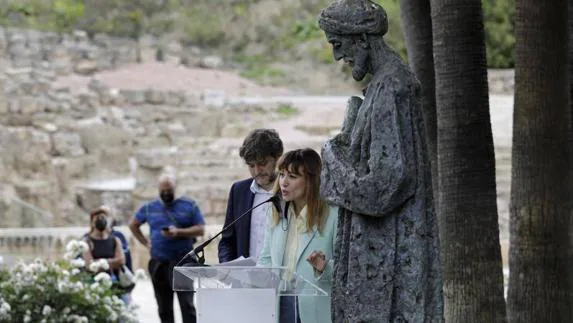

Sections
Highlight

FERNANDO TORRES
Saturday, 24 April 2021, 07:14
Compartir
The thoughts, verses and ideas of Solomon Ibn Gabirol have become a fundamental pillar of the Sephardi legacy to the world and they have been kept alive for 1,000 years. His work is essential in Jewish studies, but many people will never have heard of him. This influential 11th century Andalusian poet and philosopher was born in Malaga but became an orphan at a young age and was taken in by a prominent political figure of the time. He became a prolific writer who published over a hundred poems, as well as works of religious explanation, philosophy, ethics and satire.
To prevent him being forgotten, the Federation of Jewish Communities of Spain recently organised a two-day conference in Malaga to mark 1,000 years since he was born. Many local institutions took part, including Malaga council, the university, the Picasso Museum, the Unicaja Foundation, the Tres Culturas Foundation, the Federation of Jewish Communities and the recently-created Ibn Gabirol Association, which is headed by Salomón Castiel.
The aim was to pass on the message of tolerance and community which lies behind the poems and writings of the Sephardi poet, and the conference featured different aspects of his life, in the form of round-table discussions.
Expert opinions
On the first day, three experts talked about the figure of Ibn Gabirol as a philosopher: Dr Miguel Ángel Espinosa, professor of History and Culture of the Jewish People at Granada University; Dr Ángel Galán, a professor of Medieval History at Malaga university, who gave the historical context of the time in which Gabirol lived, saying that in the 11th century Malaga already had a sizeable port and commercial activity; and Dr Amparo Alba Cecilia of the Complutense university of Madrid, who revealed that Ibn Gabirol is known by three names, a Jewish one, a Christian one and a Muslim one, and that his poems differed greatly from his philosophical works. "For Judaism, he is one of the greatest religious poets in the world," she explained, while his philosophical thought captivated Christian scholars in the 13th century.
Also participating in the round table discussions was Line Amselem, professor at the Hauts-de-France polytechnic university. She spoke of "the different identities" that can be seen in the writings of Gabirol, and pointed out that centuries went by before it was finally realised that the works he published under his Christian name and his Sephardi writings were by the same person.
The president of the Malaga provincial authority, Francis Salado, said that the ideas of this philosopher are as vital today as they were 1,000 years ago. The mayor of Malaga, Francisco de la Torre, stressed the importance of the city embracing the values of "tolerance and respect" which Gabirol had promoted in his writings. The president of the Federation of Jewish Communities of Spain, Isaac Benzaquén, defined Gabirol as "a great man who was relegated to a second place in culture".
Concha de Santa Ana, director of the Tres Culturas Foundation pointed out that "knowledge is the greatest antidote to hatred" and María Jesús Morales of Malaga university described Gabirol as "a mirror" for academics to look into.
Publicidad
Publicidad
Publicidad
Publicidad
Reporta un error en esta noticia
Necesitas ser suscriptor para poder votar.